Guy Fieri Is Saving the Country, One Slider at a Time
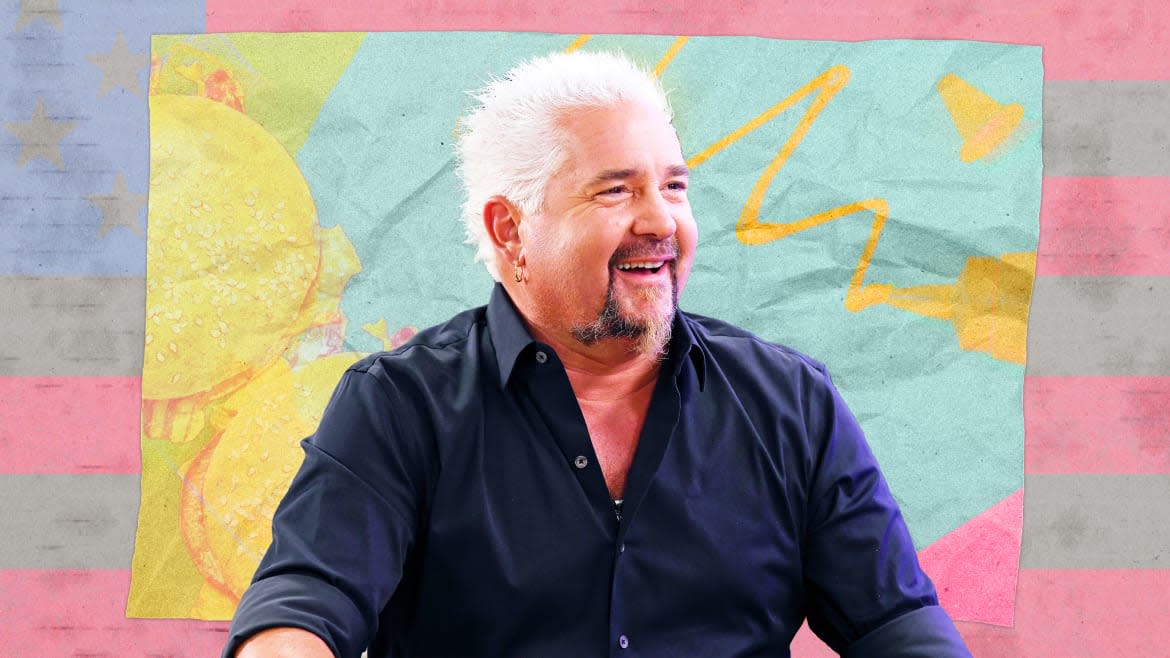
- Oops!Something went wrong.Please try again later.
- Oops!Something went wrong.Please try again later.
- Oops!Something went wrong.Please try again later.
Guy Fieri is a hero of mine.
I’m not being sarcastic. I genuinely, earnestly love this man.
Like any American with eyeballs and a television, I was immediately captivated by the host when he first burst onto my TV set, quite literally, like a flame. It’s iconography at this point, an image of modern-day Americana: Guy Fieri in an oversized bowling shirt seared with a flame pattern that points up to his impressive tan—and, finally, the bleached-blonde hair spikes, from which his seemingly boundless energy wafts off like smoke.
After winning Season 2 of The Next Food Network Star in 2006 and launching his first two long-running series, Guy’s Big Bite and Diners, Drive-Ins, and Dives, he became, essentially, a celebrity-chef matchstick, setting fire to the fast-evolving genre of food- and cooking-related television. As “Mayor of Flavortown,” he changed what we expected from the genre, not to mention how we talked about—and judged—Americans’ relationship to food. (He’s evolved, too: Fieri has been open over the years about how “Goddamn, I hate that [flame] shirt.” Growth.)
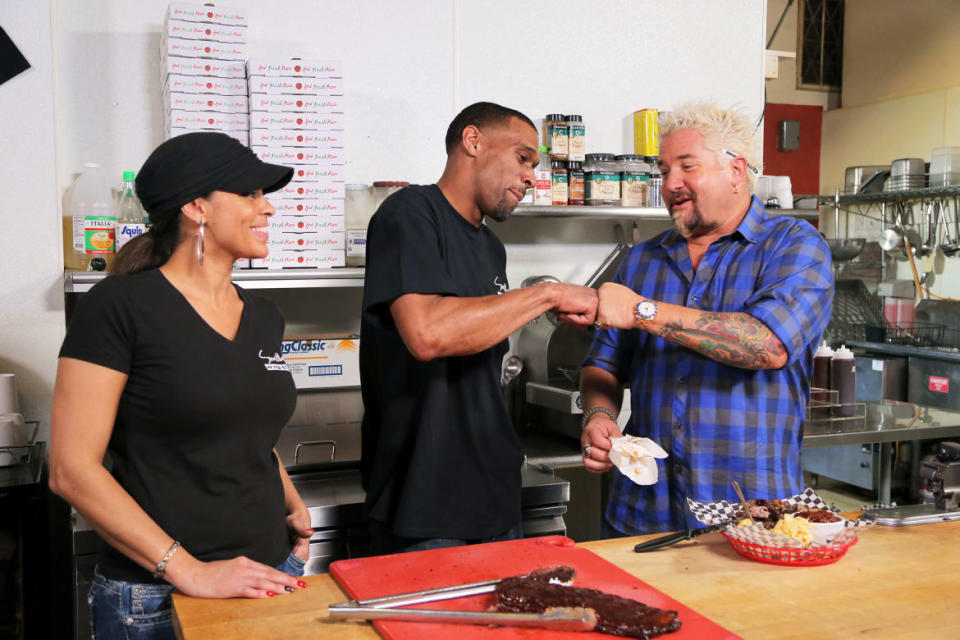
During the pandemic, things became more poignant.
For hours a day—seriously, sometimes around six or seven—I would lay on the couch in a depressive state watching Diners, Drive-Ins, and Dives (lovingly referred to by Fieri and his fans as “Triple D”). “I’ve seen this one,” I once said to myself, unsure if it was a personal low, or maybe a high-point. But what I found in my months of watching Fieri cruise around America in his red ’68 Camaro convertible, was a person—and a type of entertainment—that had a pulse on American culture at a fractured period, when every media outlet, academic, and political campaign struggled to identify it.
It’s not just that the series was comfort-viewing during an upsetting time; it was. It’s that I started to notice its unassuming, surprising progressiveness.
Here’s this guy—heh—who has successfully battled an offensive culinary reputation for soaking American cuisine in ranch dressing and then deep-frying it. He admirably obliterated the patronizing shame put on families for what they enjoy and, moreover, what they can afford. (Even The Daily Beast, a decade ago, branded him “The Trailer Park Gourmet.”) With so much of food TV myopically spotlighting the coasts, his criss-crossing of Middle America might have unfairly positioned him as the spiky-haired Food Network voice of the conservatives.
But what that show really was doing was promoting small businesses. He was paying tribute to the immigrant experience. He was saying that American food, sure, is about the arms race for the biggest hamburger or gooiest macaroni and cheese. But it’s also about the diversity of cuisine, food that celebrates all kinds of cultures and nationalities—all while still being, under the umbrella of Triple D, quintessentially American.
During the pandemic, when the government was failing to provide resources to the workers and businesses in the restaurant industry that were affected by shutdowns and closures, he raised $25 million in assistance.
Like I said: Hero. And when given a chance to speak with your hero, you take it.
That is how I ended up talking to Guy Fieri about King’s Hawaiian brand slider buns.
To be fair, Guy Fieri talks about King’s Hawaiian bread, particularly their slider buns, with gusto. There is passion. There is verve. There is a deep, intrinsic knowledge of the brand’s breadth, if you will. No one has ever spoken this gorgeously about King’s Hawaiian slider buns.
The occasion of our Zoom conversation is Fieri’s partnership with the brand’s Slider Sunday Million Dollar Showdown campaign. To celebrate the return of NFL football and tailgating, a sweepstakes offers the chance for fans to register at KingsHawaiianShowdown.com and win, you guessed it, $1 million. Different original slider recipes will face off each week, and several of Fieri’s favorite slider recipes will also be available.
“When we started this with King’s Hawaiian, they were like, ‘Do you have any slider recipes?’” Fieri tells The Daily Beast’s Obsessed. “I was like, ‘How long is this campaign going to run!” He looks into the Zoom camera like he’s making eye contact, smirks, and then lets out his famous, guttural guffaw, a move you know well if you are also a person who has seen all 571 episodes of Diners, Drive-Ins, and Dives. It is thrilling.
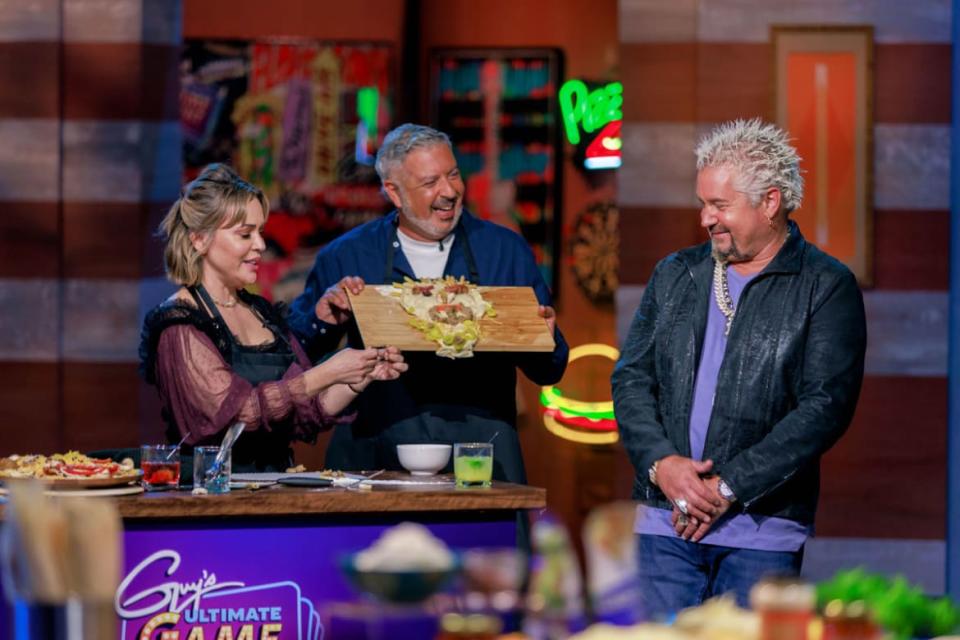
There are several reasons, he says, that he’s taking part in this campaign.
Football season and Sunday Funday are sacred in his house. “Any time I have the chance to take my job and take my personal life—take my chef life and take my family life—and put it all together in one thing, it’s awesome.” There’s an obvious glee he takes in handing out money on shows like Guy’s Grocery Games, not to mention through his pandemic fundraising. “You can just be a regular person and go on this website and win a million bucks? No one wins $1 million anymore!”
And, dutiful brand partner he is, he says over and over—and over—again that he just really frickin’ likes King’s Hawaiian bread. (The choice of bread in his restaurants! The pretzel buns are particularly great!)
We Need Guy Fieri in Trump’s America
There is so much I want to ask him about.
His new show, Guy’s Ultimate Game Night just premiered. Given the pretentious, unfair dismissal his over-the-top style of cuisine gets, how does he feel about the difference between indulgence and gluttony? (Guy Fieri is carb-conscious, guys, and can cook just about every kind of food—not just Trash Can Nachos.) How does a food obsessive and food-TV enthusiast like me reconcile the fact that I can’t and, further, do not like to cook? And does he recognize the subtle power of Triple D?
Bless this beautiful, busy man, we did talk about those things. But first, and as agreed upon before this interview, Guy Fieri must tell me everything he knows about sliders.
A major scheduling bummer for someone who hosts roughly a dozen TV shows is that Fieri will miss the first Sunday Funday tailgate of the football season at his ranch. He’ll be in New Mexico shooting Triple D. Nothing delights him like cooking the weekly feast for friends and family. “I’m not playing on the gridiron, I’m playing on the griddle,” he says. Poetry.
There are reasons that sliders are the perfect tailgate food (beyond the fact that he is currently an ambassador for a King’s Hawaiian slider-related campaign). You can consume it in one or two bites. “You don’t have to make the commitment to a foot-long sandwich.” There’s also no need to marry one’s self to one kind of taste. Have an American-style slider, then one that’s spicy, and maybe one inspired by international cuisine. Grab a vegetarian one if you’re feeling wild. Heck, frolic from beef to pork to chicken.
“Being the Mayor of Flavortown, I want to have a little bit of something different at all times,” he says.
I ask the quintessential question pondered by anyone who has ever attended a cocktail party—or, in the case of most other people, a tailgate: How many sliders is too many sliders to eat? At what point should you start to feel bad?
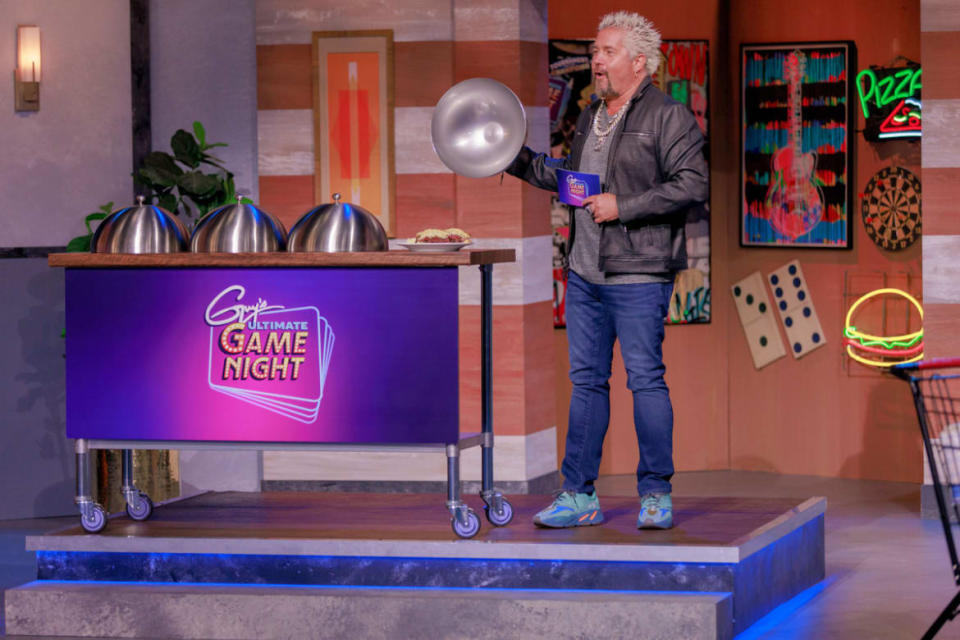
“Sunday’s not about feeling like that,” he says. “Monday is a different story.” Unsurprisingly, he doesn’t participate in the culture of “too much.”
With his TV series and the wide variety of food he’s showcased—including portion sizes and different nutritional considerations—he’s interacted with this idea of gluttony vs. indulgence. The former has an undeniable negative connotation. (That’s what happens when you’re one of the deadly sins.) The other is associated with a certain kind of “self-care,” and isn’t siloed to unhealthy foods. One can indulge in something gluten-free or vegan—or a particularly succulent piece of fruit, for example—just as they can indulge in a piece of chocolate cake.
“The difference has to do with the quality of the product,” he says. As mentioned earlier, he watches his carb intake. But if he’s going to have bread, he’s going to eat—all together now!—King’s Hawaiian.
Earlier that morning, he spoke at a school as part of the ProStart campaign that he’s involved in alongside the National Restaurant Association Educational Foundation. “I told the kids that one of the first decisions you’re going to start making in your young adult life is the decision of what you put in your body—making the decision about eating as smart as you can,” he says. “That doesn’t mean everything has to be all super-healthy or all over-the-top, but it does mean making decisions.”
On the subject of decision-making, I take the opportunity to ask him about a stressful one I often face. I like good food. I like to share good food with people I love. I watch every single food show on television, and therefore can speak about reductions and sautés and why one should never attempt to cook a risotto in 30 minutes. (It requires too much attention!) Yet when faced with the choice of ordering food or suffering an emotional breakdown because I can’t tell if my pan is simmering, it’s take-out every time.
Am I failing as a host? As an indulger? As a potential future slider enthusiast?
There’s this Thai food place by his house, Fieri explains. He’s good at cooking Thai food. But he knows that anything that restaurant cooks is going to be better. “I still get a little twitch that I’m ordering, because I believe that I can make it.”
The previous night, he cooked his family a lavish meal, the centerpiece of which was homemade gnocchi. The Fieris had spent the entire day on the ranch in the hot sun, hanging out at the pool. When he started cooking, they were aghast: You’re really going to cook after such a long, exhausting day?
“This is my therapy, this is my relaxing time,” He says. “I don’t shame you. If you want to order it, order it. Just order good. That’s the thing: make everything count.”
Make everything count, you say? Sounds like my opportunity to sneak in my questions about the greatest television program in our modern era: Diners, Drive-Ins, and Dives.
(Fieri has a very fun new series, Guy’s Ultimate Game Night, for which the Food Network built an entire Flavortown Lounge where celebrity guests and the audience can eat, drink, and play party games. He brings it up several times, and I’m so sorry to Mr. Mayor for derailing the conversation to Triple D instead.)
“I imagine you get a pretty good amount of self-fulfillment and appreciation, knowing that you get to take information that’s out there and then share it with the masses,” he tells me, after which I am incredibly touched. “You know, like you’e going to highlight all this great stuff that we’re doing with King’s Hawaiian and this Million Dollar Showdown.” Well-played, sir.
“I get that same feeling of appreciation that I get to shine the light on Mom and Pop joints that probably were never going to really get recognized outside of their town,” he continues. “I get to walk in, and I’m not doing anything special. All I do is shine the light on them. They’re already the people who are doing this. They’re making this great food. They’ve got this awesome story.”
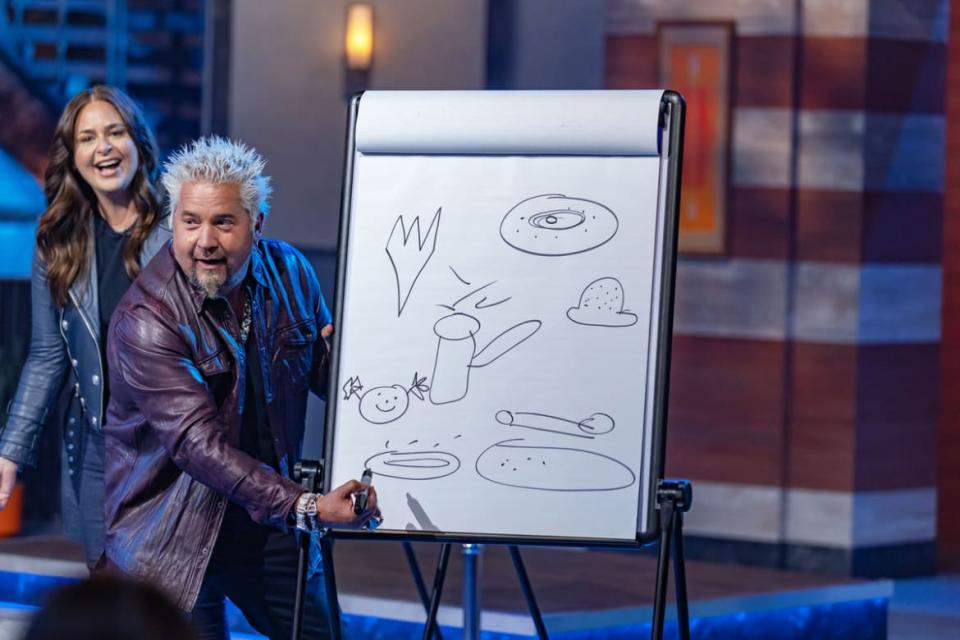
Part of watching Triple D is salivating over the food. A solid attraction of it is gawking at the million-calorie monstrosities. And there’s definitely an education going on as part of the series’ tourism: what life is like in different areas of America. But the emotional element is what makes the series work. It’s understanding the hardships that have been endured by multiple generations of a family, all of which come through in the beauty of the food they’ve devoted their lives to creating.
“I get to come in and say, ‘Hey, America, look at this great food and these amazing people.”
Fieri’s humility about it all is understandable. You kind of have to be like that when you’re a celebrity. But the fact is that Fieri is operating an empire. Last year, Fieri signed a new $80 million contract with the Food Network to continue his suite of programming. He owns multiple restaurants across the country. Diners, Drive-Ins, and Dives is going into its 17th year. His value to a charitable foundation or, in this case, a brand, is immeasurable.
Still, as he says it, it’s about everyone else. Not him.
“Being the guy that gets to applaud somebody and recognize them and have them stand up in the crowd is probably one of the neatest feelings in the world,” he says. “I think that if I hadn’t felt such a personal connection as a chef, as a restaurant owner, as a dad, as a son, as a sibling—if I didn’t have those feelings—16 years is a long time to do something... I don’t know that I would still be doing it.”
It can all pretty much be distilled down to the last thing he said to me, brilliantly tying that thought back to his partnership with the King’s Hawaiian sweepstakes (this man is a pro): “Enough people want to talk about the bad things. I’m not a negative energy guy. I’m a positive guy. I’m into the stuff that does make a difference.”
Now let’s all go make some tiny hamburgers.
Get the Daily Beast's biggest scoops and scandals delivered right to your inbox. Sign up now.
Stay informed and gain unlimited access to the Daily Beast's unmatched reporting. Subscribe now.

